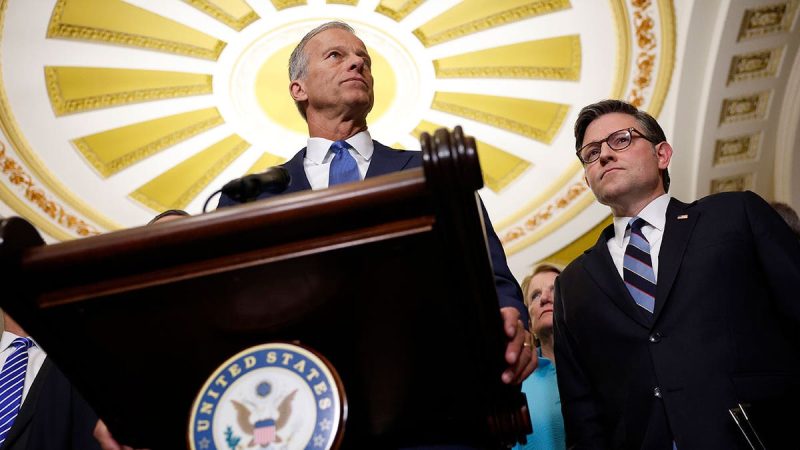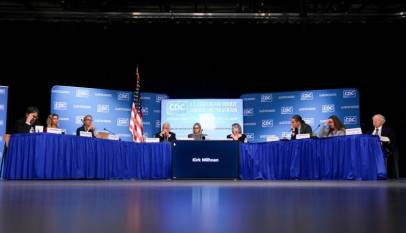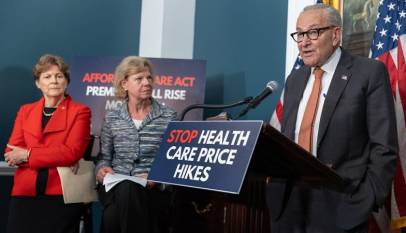Several weeks into the government shutdown, the notion of reopening seemed impossible.
Both Senate Republicans and Democrats were deeply entrenched in their positions for 41 days and 40 nights, and neither side wanted to appear to be caving to the other.
Senate Minority Leader Chuck Schumer, D-N.Y., and his caucus wanted a guaranteed deal on expiring Obamacare subsidies, while Senate Majority Leader John Thune, R-S.D., argued that the government needed to reopen first.
But an explosion of bipartisan talks, pushed by external pressures of federal workers going unpaid, federal food benefits in jeopardy, and air travel grinding to a standstill, invigorated a working group of senators to build an off-ramp out of the historic closure.
The result was a bipartisan deal that included a trio of spending bills meant to jump-start the government funding process, an extension of the original House-passed continuing resolution (CR) to Jan. 30, 2026, to provide time to fund the government the old-fashioned way, and a renewed guarantee that Senate Democrats would get their vote on expiring Obamacare subsidies.
In the end, the shutdown dragged on for 43 days, with the climactic vote to end it and send the package to the White House unfolding in the House on Wednesday.
House Appropriations Committee Chairman Tom Cole, R-Okla., who was part of crafting the final spending deal, said discussions on those three bills had begun ‘long before’ the shutdown.
‘We certainly had some knotty issues, a hemp issue, disagreements on funding levels and all that. But for the most part, we worked those through. And I would tell you from our side and I would assume from the other, the three big players were the Cardinals themselves,’ Cole said, referring to the three House Republican subcommittee chairs who led discussions on the three individual bills.
‘Our Democratic colleagues that voted against the bills had plenty of input in the bills. The real question will be in the next package — can you guys bring any votes? If you’re not going to bring any votes, our negotiation will be a waste of time, and we’ll be required to construct a coalition that’s all Republican.’
Nevertheless, most of the eight Senate Democrats that crossed the aisle viewed the guarantee of a vote on Obamacare as the turning point, though it lacked the guaranteed outcome that Schumer and the majority of the caucus sought.
‘There was no vote that we were going to get on the Affordable Care Act premium tax credits,’ Sen. Jeanne Shaheen, D-N.H., said on Sunday, referring to Obamacare. ‘We have a guaranteed vote by a guaranteed date on a bill that we will write, not that the Republicans will write.’
For Sen. Tim Kaine, D-Va., who proved the decisive Democratic vote that sealed the deal on the proposal in the Senate, it was provisions that would rehire and protect workers fired by the Trump administration.
Kaine recalled that it was just hours before the Senate was set to take a key test vote on the CR that he changed his mind. Up to that point, the White House had not wanted to include language that would have reversed the reductions in force (RIFs) that had been ordered at the start of the shutdown.
But it was through Sen. Katie Britt, R-Ala., who was a key negotiator in the Senate, that Kaine got the White House on board.
‘I said, I’m a no if you don’t do that, I’m a no, and you know that it was 4:45 p.m. in the afternoon on Sunday when they told me they would do that,’ he said.
Kaine noted that with 320,000 federal workers in Virginia and 2 million nationally, he recognized it was a big ask.
‘And I told her, and when I explained it to her, she said, that’s a reasonable ask, but that the White House didn’t want to do it,’ he said. ‘And she was a little bit of a go-between and helping me.’
FAA investigates airlines for potential flight cut compliance violations during government shutdown
The Federal Aviation Administration this week told airlines it will investigate whether th…













